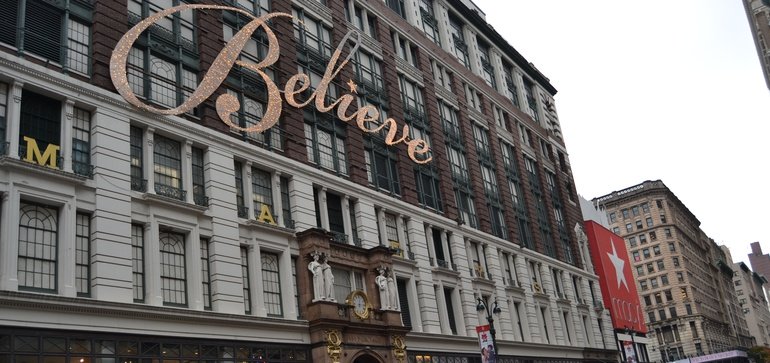Credit: Cara Salpini for Retail Dive
AUTHOR |Daphne Howland
Source: www.retaildive.com, January 2020
After enjoying some momentum in 2017 and 2018, and despite share given up by bankrupt players like Sears and Bon-Ton, department stores stalled and lost share in 2019, Moody’s analysts warned in a report Wednesday.
The analysts, led by Christina Boni, are projecting a 20% drop in operating income for 2019, despite a strong consumer, but said department stores may stem their decline this year. Still, the pressure is on, with Moody’s expectation of a 5% operating income downtick for 2020 representing a 25% decline on a two-year basis.
According to Moody’s, the economy and consumer confidence were “solid” in the U.S., but department stores underperformed the industry in 2019, including during the recently wrapped holiday season.
Bloated inventories led to “shocking” discounts, making it possibly the “most promotional holiday since the recession,” according to an earlier report from MKM Partners Managing Director Roxanne Meyer. Moody’s analysts noted that, too, and said that inventory control would be critical this year.
“Department stores over-anticipated demand last year and struggled to align inventory,” Boni’s team wrote, noting they must make inventory readily available and fulfillment speedy at the same time that they acquire less inventory and manage selling, general and administrative costs. Margin and operating income pressures will force these retailers to “become even more aggressive in their transformation and manage inventories much more effectively than they have been doing,” they also said.
Moody’s singled out Macy’s and Kohl’s as players that have done many of the right things but face mounting odds, with holiday sales representative of the overall performance in the sector, which they characterized as “tepid at best.” Macy’s earlier this month reported that store comps on an owned basis fell 0.7% over the nine-week holiday period ended Jan. 4, as comps on an owned plus licensed basis fell 0.6%. Moody’s noted that Macy’s has already announced the closure of 28 namesake stores this year, adding “we are expecting store square footage to contract roughly 3% more in 2020, after roughly an estimated 4% decline in 2019.”
Meanwhile, Kohl’s on Jan. 9 reported that November to December holiday comparable sales fell 0.2% year over year and pulled back expectations for its fiscal 2019 earnings to the lower end of its guidance. That forces the discount department store to re-evaluate some aspects of its operations, according to Moody’s analysts.
“Kohl’s, which has been more focused on investing to gain market share, will have to rethink what the right balance is between profitability and growth given that its holiday season was very tepid,” they said. “In 2020, Kohl’s needs to prove that its new initiatives such as a focus on beauty, can convert the traffic into sales with limited pressure on costs to stabilize its margin profile.”
Nordstrom, which has yet to report on its holiday performance and has discontinued reporting comps in any case, appears to have a clearer runway this year, in Moody’s estimation. “Although Nordstrom has continued to experience weak sales trends in its full line business, it has been a leader in stabilizing margins as it focuses on its local area market strategy, which works to increase product assessibility and inventory efficiency in a given market,” Moody’s said, noting that the expansion of its Local strategy could help boost margins this year, especially with the major costs of building and opening its New York City flagship now largely behind it.
Not all is doom and gloom for the sector, however. For some, notably Macy’s and Nordstrom, store credit cards bring in cash and loyalty, according to Moody’s. “Earnings have become critically dependent on credit income,” they said, placing it at “around 50% for both Macy’s and Nordstrom, Inc,” though the firm also pointed out that the performance of these companies “would look much worse without this income stream.”
And Moody’s called “data and its application … a bright spot,” although they also warned that “it is still early days with respect to many of these initiatives.” Analysts called on department stores “to mine data to leverage resources more efficiently, particularly for inventory. ”
Follow Daphne Howland on Twitter

